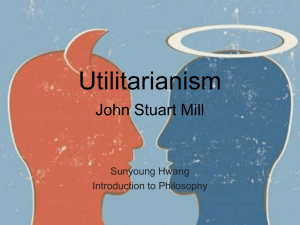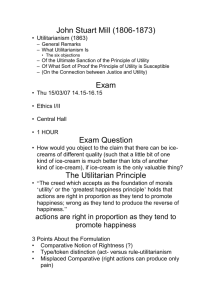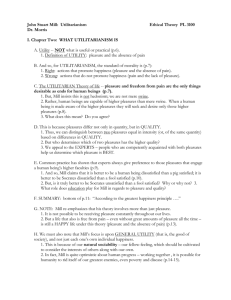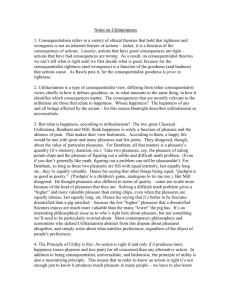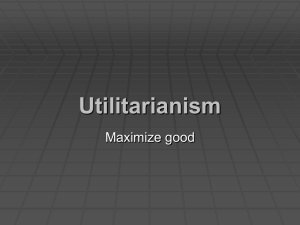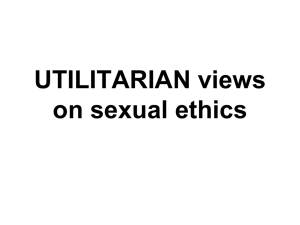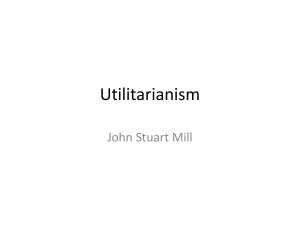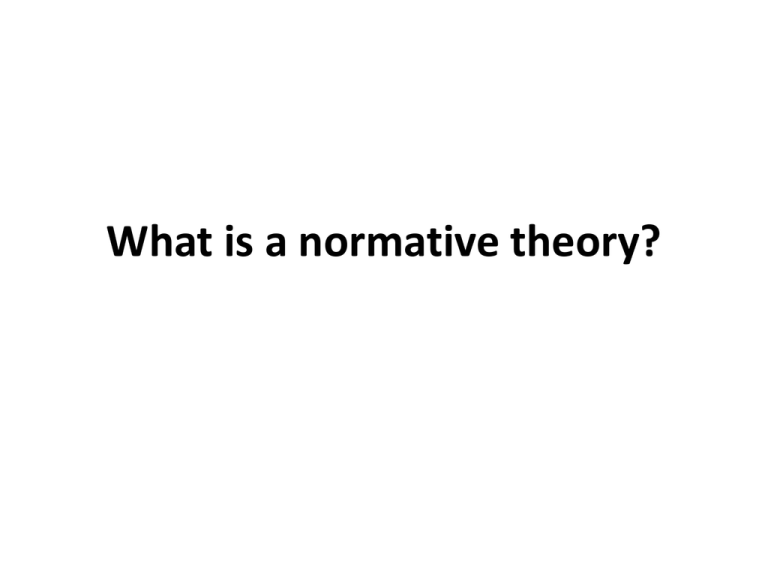
What is a normative theory?
A normative theory is an intellectual
tool or system that helps us decide
on morality and moral issues. It is
designed to answer the question
‘what is it that makes an action right
or wrong?’
Name 2 normative theories.
Utilitarianism and Kantianism.
What is the main feature of
teleological theory?
Actions are right or wrong based
upon the consequences they
produce.
Who are the two main
proponents of Utilitarianism?
Jeremy Bentham and
John Stuart Mill.
What is the Greatest Happiness
Principle?
The Greatest Happiness Principle
(GHP) states that actions are right
in proportion as they tend to
produce happiness and wrong as
they tend to promote the reverse of
happiness (Mill).
Explain the different parts of
GHP.
The only thing that matters are the
consequences of an action
(Consequentialist Principle), the
only consequences that matter is
happiness/unhappiness (Hedonic
Principle) and the happiness of
everyone should be equally
considered (Equity Principle).
Why is Mill a consequentialist?
As an empiricist, he believes that
knowledge is a posteriori (comes
through experience). Mill thinks
that we cannot know in advance
whether an action is right or wrong,
it is only by predicting what the
consequences will be that we can
establish what is right and wrong.
What did Bentham think were
humanity’s sovereign masters?
Pain and pleasure.
According to the Hedonic Principle,
what is the only thing worth
valuing?
Pleasure or happiness.
How, according to Bentham, can
we measure pleasure?
The Hedonic Calculus.
Describe the Hedonic Calculus.
The Hedonic Calculus has seven
features, which must be used in
order to evaluate competing
pleasures.
Why does Mill think the Hedonic
Calculus is not adequate?
Mill thinks the amount of pleasure
we can get from an act is less
important than the quality of
pleasure we get from an act. He
thinks that some pleasures are
qualitatively different from one
another.
What system does Mill believe sorts
out the qualitative problem?
Higher and Lower pleasures.
Give three examples of both
higher and lower pleasures.
Higher pleasures (intellectual),
literature, music and the arts.
Lower pleasures (body), eating,
drinking and sex.
Who can decide between these
competing pleasures?
Competent Judges – those who
have experienced both higher and
lower pleasures. Competent Judges
will always prefer higher pleasures.
What does Mill have to say to the
objection that many people will not
always choose higher pleasures?
Higher pleasures require constant
development and once we have
tried them we will always prefer
them. Lower pleasures are available
to everyone, higher pleasures are
not.
Why does the Equity Principle
add altruism to Utilitarianism?
It means that we can account for
actions that help others rather than
just ourselves (egoism).
Explain aggregate happiness?
Aggregate happiness can either be
the majority being a little happy or
a minority being extremely happy.
What are the two branches of
Utilitarianism?
Act and Rule Utilitarianism.
What is Act Utilitarianism?
Act Utilitarians ask what would
happen if they do a certain thing.
They examine each situation
individually and try to work out
what the consequences will be.
What is Rule Utilitarianism?
Rule Utilitarians ask what would
happen if there was no such law.
They believe that laws are in place
for the long-term benefit of all.
Don’t lie or always keep your
promises are rules that generally
are in everyone’s best interests.
What is the division within Rule
Utilitarianism?
Hard/strong Rule Utilitarians and
Weak/soft Rule Utilitarianism.
Don’t lie – explain how strong and
weak Rule would interpret this!
Strong Rule – never lie
Weak Rule – only lie in extreme
cases but the rule should remain.
What are the problems with
happiness?
Quantifying happiness – both
Bentham and Mill cannot do this
well enough.
Bad pleasures – sadistic people.
There is also something wrong with
masochists who get pleasure from
receiving pain?
What are the problems with
consequences?
Predicted vs. Actual consequences
Short-term vs. long-term
consequences
Local vs. Global consequences
What are the problems with
equity?
Tyranny of the majority
Justice and rights
Special obligations
Why do some claim
Utilitarianism is too demanding?
Endless list of calculating
consequences
We will almost always lose out



